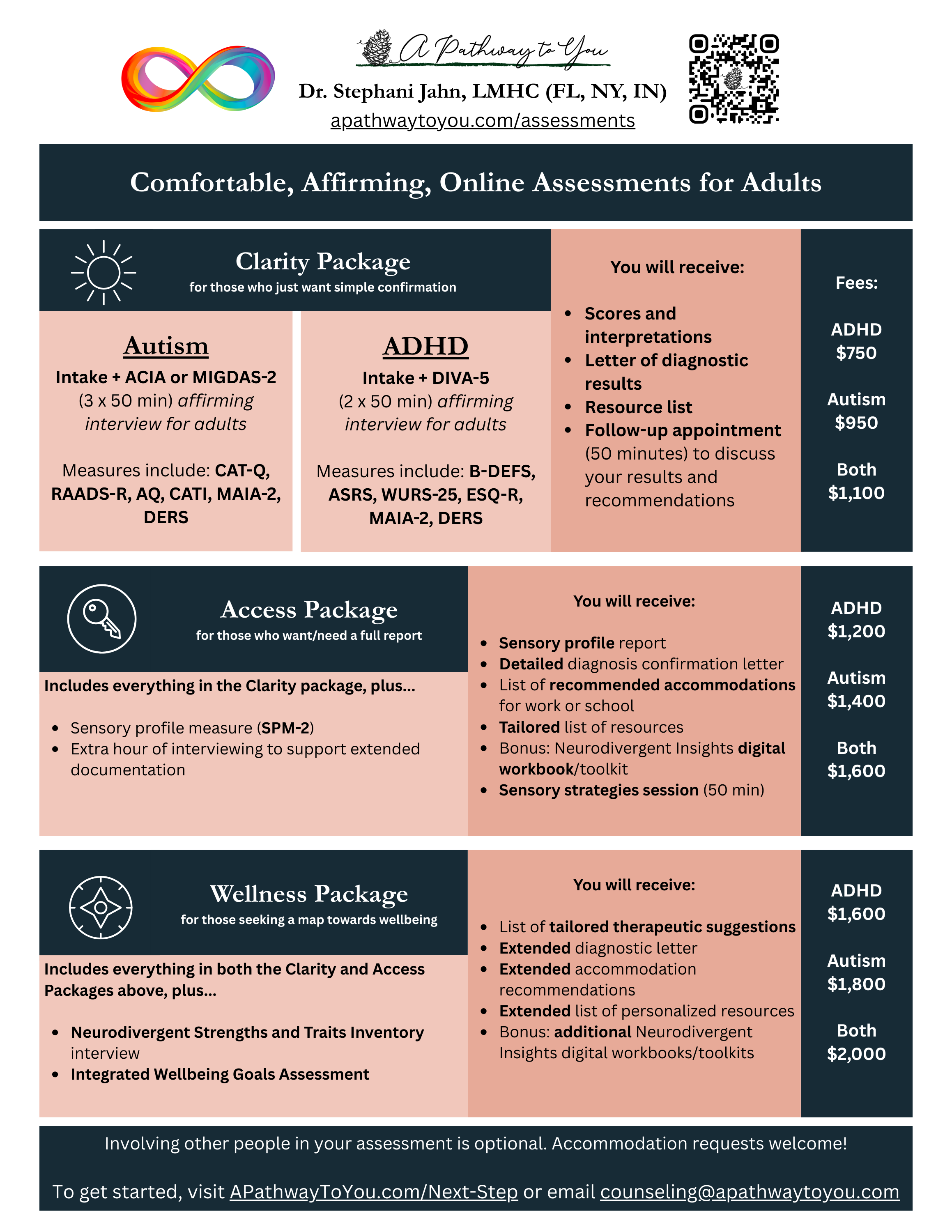
Comfortable, Affirming, Online
Autism & ADHD Assessments for Adults

Does this sound like you?…
All your life, you’ve struggled to fit in and never quite feel you belong
You have to put in extra effort to seem “normal” and meet expectations
You find everyday situations overwhelming, while others are unfazed
Your socials are showing you more neurodivergent content—and it’s oddly relatable
You have a running list of your Autistic or ADHD traits, or are “peer reviewed,” but you want a professional to confirm if it adds up
You already self-identify as ADHD or Autistic, and want to feel more confident about that, need a formal diagnosis for accommodations, or need guidance about how to meet your neurodivergent needs
You’re not alone! Many late-diagnosed Autistic and ADHD people have been through these experiences—including me. And let me tell you, there is a whole world of possibilities once you discover your neurotype! Let’s see what we can do for you.
My qualifications
PhD-level Licensed Mental Health Counselor (LMHC)
Diagnostic Privilege -qualified to diagnose Autism, ADHD, and anything in the DSM in all my states of licensure
Trained in affirming assessment for Autism and ADHD by clinicians who share those neurotypes
AuDHD, late-identified - my lived experience helps me recognize “neurokin,” including those who’ve gone undiagnosed
Active in Autistic and ADHD communities and dedicated to learning from ND-identified and affirming sources
My approach
- Collaborative - I see you as the expert on your lived experience, while I’m the one who confirms how that aligns with diagnostic criteria and community knowledge.
- Compassionate - My clients express they’ve felt understood in a rare and positive way in our assessment process. They leave with an uplifting sense of knowing themselves better, and having new tools to fit their needs.
- Transparent - I avoid making you wait for a “big reveal” about the end of the assessment. I’ll keep you informed on what seems to be showing up as we go along. I love to answer questions about the process.
- Accommodating - Type in the chat, turn on live captions, stim freely, turn off your video, and share input via email—ask for what you need at any time!
- Holistic - I account for factors like masking and influences of your race, culture, and gender in your life. This helps avoid missing diagnoses for people who get missed by traditional approaches.
Having a provider you can be comfortable with matters. Learn more about my identities and values here.
I believe that your self-understanding—not just a professional’s opinion—is what will make a real difference in your life.
Affirming Autism Assessment for Adults
I’m trained in assessment methods that account for presentations that are traditionally missed, including those who are:
high-masking
low support needs (sometimes called “level 1/high-functioning”)
well-accommodated/healthy (traditional approaches focus on signs of Autistic distress, overlooking uniquely Autistic indicators of wellness)
PDAers, AuDHDers, extraverts, women, and others who contradict stereotypes
Information we’ll collect in your Autism assessment
Affirming interviews
Intake interview
ACIA (Autism Clinical Interview for Adults), and/or
MIGDAS-2, the Monteiro Interview Guidelines for Diagnosing the Autism Spectrum, second edition
Unlike the common ADOS-2’s supposedly “gold standard” process, you won’t be subjected to childish, confusing activities. These interviews can actually be kind of enjoyable, because we’ll embrace your special interests, sensory needs, and natural interaction style.
Self-report measures
ACIA’s Pre-Interview Questionnaire
CAT-Q, the Camouflaging Autistic Traits Questionnaire
RAADS-R, the Ritvo Autism Asperger Diagnostic Scale-Revised
AQ, the Autism Spectrum Quotient
CATI, the Comprehensive Autistic Trait Inventory
Plus measures of emotion regulation and interoception (related to recognizing bodily needs and emotions, associated with autism)
Other sources
Collateral - YOU choose whether to involve people like your partner/s, friends, coworkers, family members, etc.
Records - You can also share things like childhood records or your own self-observations while questioning your neurotype (yes, I know it’s 20 pages long—and that’s relevant!)
Affirming ADHD Assessment for Adults
I’m trained in assessment methods that account for presentations that are traditionally missed, including ADHD adults in general, especially those who are:
high-masking or have compensatory strategies/supports
have hyperactivity that is mental/internalized/suppressed
experience hyperfocus
meet traditional measures of success (e.g., academics, career)
told they are “just lazy” or “need to try harder/smarter”
AuDHDers, introverts, women, and others who contradict stereotypes
Information we’ll collect in your ADHD assessment
Affirming interviews
Intake interview
DIVA-5 interview (the Diagnostic Interview for ADHD in adults)
This is a semi-structured interview, and I facilitate it in an affirming way.
If memory is difficult for you (as is common for ADHDers), we can work together to uncover your truths.
Self-report measures
BDEFS-LF, the Barkley Deficits of Executive Functioning Scale-Long Form
ASRS, the Adult Self-Report Scale v. 1.1
ESQ-R, the Executive Skills Questionnaire-Revised
WURS-25, the Wender-Utah Rating Scale-25
Adult ADHD Masking Measure
Plus measures of emotion regulation and interoception (related to recognizing bodily needs and emotions, associated with ADHD)
Other sources
Collateral - YOU choose whether to involve people like your partner/s, friends, coworkers, family members, etc.
Records - You can also share things like childhood records or your own self-observations while questioning your neurotype (or your intention to write it down or the fact that you misplaced it… that’s relevant info, too)
Ready to begin?
All assessments take place fully online.
Current openings are available.
Assessment fees
I offer three packages to help you get your particular needs met. For each, you can decide whether you want to explore Autism, ADHD, or both, with fees beginning at $750.
Click to expand. For a chart visualizing the same information, see below.
An accordion menu with three sections follows
-
For those who just want simple confirmation.
ADHD $750 - Autism $950 - Both $1,100ADHD assessment includes:
Intake + DIVA-5 interview, an affirming interview appropriate for adults (two appointments of 50 minutes)
Measures: B-DEFS, ASRS, WURS-25, ESQ-R, MAIA-2, DERS
Autism assessment includes:
Intake and ACIA or MIGDAS-2 interview, an affirming interview appropriate for adults (three appointments of 50 minutes)
Measures: CAT-Q, RAADS-R, AQ, CATI, MAIA-2, DERS
After the assessment, you will receive:
Scores and interpretations
Letter of diagnostic results
Resource list
Follow-up appointment (50 minutes) to discuss your results and recommendations
-
For those who want/need a full report
ADHD $1,200 - Autism $1,400 - both $1,600Includes everything in the Clarity Package above, plus:
Sensory profile measure (SPM-2)
Extra 50 minutes of interviewing to support extended documentation
You will also receive everything in the Clarity package, plus:
Sensory profile report
Detailed diagnosis confirmation letter
List of recommended accommodations for work or school
Tailored list of resources
Bonus: Neurodivergent Insights digital workbook/toolkit
Sensory strategies session (50 minutes)
-
For those seeking a map towards wellbeing.
ADHD $1,600 - Autism $1,800 - both $2,000Includes everything in both the Clarity and Access Packages above, plus:
A collaborative deep dive into your challenges, goals, and helpful strategies (two 50-minute sessions), including:
Neurodivergent Strengths and Traits Inventory
Integrated Wellbeing Goals Assessment
You will also receive everything in the Clarity and Access Packages above, plus:
List of tailored therapeutic suggestions
Extended diagnostic letter
Extended accommodation recommendations
Extended list of personalized resources
Bonus: additional Neurodivergent Insights digital workbooks/toolkits
Involving other people in your assessment is optional.
Accommodation requests are welcome!
General information

Assessment Fees Graphic
All text in the image and table are represented verbatim in the Assessment Fees section above.
Zoom in to view details, or click the image to download as a PDF.
For those needing an accessible alternative, the information contained mirrors the section above. If this does not meet your needs, please email counseling@apathwaytoyou.com
Additional services
Assessment package add-ons:
Additional follow-up consultation
Helpful for fine-tuning strategies, getting support for identity reflections)
$165 for 50 minutes
Additional interviewing/document review
For complex cases or assessing additional diagnose
$25/quarter-hour
Stand-alone services:
“Second opinion” review
Review of prior assessment report, with meeting to discuss impressions and recommendations
$25/quarter-hour
“Questioning” consultation (non-diagnostic)
For those who are unsure about seeking formal diagnosis, or want a less extensive exploration of their neurotype
$165 per 50 minutes, prorated from 30-90 minutes
Payment & insurance
All services are self-pay only.
A $250 deposit is required to secure appointments and receive assessment forms.
At your request, I will provide superbills that you can submit to insurance for out-of-network (OON) coverage, depending on your plan.
I can recommend services that will file OON claims for you for a small fee. They can also check your coverage and fight claim denials. (No financial conflict to disclose.)
Not all insurance plans will cover diagnostic assessments, and some may cover only certain parts of it. Confirm coverage with your insurance provider in advance; expand the next section for what to ask about.
-
The CPT codes to check with your insurance are:
1 unit of 96130 Assessment: psychological testing, evaluation by qualified healthcare provider, first hour
2 units of 96131 Assessment: psychological testing, evaluation by qualified healthcare provider, each additional hour
1 unit of 96136 Assessment: psychological test administration and scoring by qualified healthcare provider, first 30 minutes
2 units of 96137 Assessment: psychological test administration and scoring by qualified healthcare provider, each additional 30 minutes
2 units of 90834 or 90847 Individual Psychotherapy, 38-52 minutes or 53-60 minutes
Be sure to mention that it's telehealth, with the Place of Service (POS) code: 10 (if you log into assessment calls from home) or 02 (if you log in from somewhere else). Specifically ask if there are telehealth exclusions. Some insurers don't mention that and it can cause an issue later.
Important notes
It is your responsibility to verify that the results of this assessment will meet your needs, and I am happy to do what I can to help you clarify that. These are some factors you might consider:
My assessments are NOT “neuropsychological testing,” which may be required by some entities.
I am a Licensed Mental Health Counselor, NOT a Psychologist. However, like Psychologists, I am a PhD-level provider (rather than Master’s-level), which can be helpful sometimes.
My assessments are NOT intended to support seeking SSDI.
I can NOT prescribe medication. I can provide information to prescribing providers at your request and with your written consent.
I do not provide ESA letters at this time, although I gladly provide documentation for other accommodations.
To learn more
Visit my page about things to consider when deciding to seek a formal diagnosis, or reach out for a free brief consultation with me.







